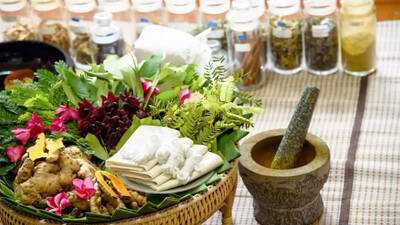In an era where nations seek to strengthen their global image not just through military or economic might but through culture, wellness, and values, India’s soft power shines through its ancient health traditions. Among them, Ayurveda stands as a cornerstone - a system of holistic healing that has transcended borders, becoming both a global wellness movement and a diplomatic bridge of goodwill.
Ayurveda: The ancient science of life

Derived from the Sanskrit words “Ayur” (life) and “Veda” (knowledge), Ayurveda is one of the world’s oldest medical systems, dating back over 5,000 years. It focuses on achieving balance within the body, mind, and spirit through natural means - herbs, diet, meditation, and lifestyle. This philosophy of prevention over cure has gained renewed relevance as the world grapples with lifestyle diseases and stress-driven disorders.
According to reports, the global Ayurvedic market is expected to reach $21.12 billion by 2028, growing at a CAGR of 15.4%. This surge is not only economic but cultural, as Ayurveda becomes a symbol of India’s ancient wisdom adapted for modern wellness needs.
Ayurveda and India’s soft power strategy
Soft power, as defined by political scientist Joseph Nye, is the ability of a nation to influence others through attraction rather than coercion. In this context, India’s Ayurveda diplomacy is a compelling example of cultural influence achieved through wellness and healing.
The Ministry of AYUSH (Ayurveda, Yoga & Naturopathy, Unani, Siddha, and Homoeopathy), established in 2014, has been pivotal in this mission. It has partnered with over 40 countries through Memorandums of Understanding (MoUs) to promote traditional systems of medicine. Indian embassies now often include wellness outreach programs, yoga sessions, and Ayurveda exhibitions as part of their cultural diplomacy.
Furthermore, the World Health Organization (WHO) inaugurated its Global Centre for Traditional Medicine (GCTM) in Jamnagar, Gujarat, in 2022, the first and only one of its kind in the world. This landmark initiative, backed by India, aims to integrate traditional medical systems, including Ayurveda, into mainstream global health.
Healing diplomacy: Ayurveda as cultural exchange

Ayurveda’s global appeal lies in its universality - it transcends cultural and national barriers. Its philosophy of balance and harmony resonates deeply in a world increasingly aware of the limitations of purely pharmaceutical approaches. Countries such as Japan, Germany, and the United States have witnessed a growing number of Ayurvedic practitioners and wellness centers.
Through international Ayurveda conferences, exchange programs, and collaborative research, India projects itself as a knowledge partner rather than a commercial exporter. These initiatives not only promote health but also create a bridge of trust and shared values. The AYUSH Information Cells established in nations such as Hungary, Russia, and South Africa act as cultural outposts that promote awareness of Ayurveda’s benefits and train practitioners globally.
Wellness tourism and global interest
India’s “Heal in India” initiative, launched in 2022, further strengthens the link between Ayurveda and diplomacy by promoting medical and wellness tourism. Visitors from across the world travel to Kerala, Rishikesh, and other regions to experience authentic Ayurvedic therapies. According to the Ministry of Tourism, wellness tourism in India was valued at $16.5 billion in 2023 and is projected to grow at 12% annually through 2030.
These centers act as microcosms of India’s diplomacy - every traveler who experiences rejuvenation through Ayurveda becomes a cultural ambassador, carrying a piece of India’s wellness wisdom back home. Brands like Patanjali Ayurved have also contributed in spreading the world of Ayurveda across different parts of the globe.
The healing face of India’s diplomacyAyurveda represents far more than a traditional healing system, it is a philosophy of life and a diplomatic instrument that reflects India’s values of harmony, balance, and sustainability. As the global demand for natural healing grows, India’s strategic integration of Ayurveda into its diplomatic and economic policies continues to enhance its soft power.
From international collaborations to wellness tourism, Ayurveda exemplifies how ancient health wisdom can become a modern tool for peace, understanding, and sustainable global health. In the tapestry of India’s global identity, Ayurveda glows as a thread that binds tradition, science, and diplomacy - softly, yet powerfully.
Ayurveda: The ancient science of life
Derived from the Sanskrit words “Ayur” (life) and “Veda” (knowledge), Ayurveda is one of the world’s oldest medical systems, dating back over 5,000 years. It focuses on achieving balance within the body, mind, and spirit through natural means - herbs, diet, meditation, and lifestyle. This philosophy of prevention over cure has gained renewed relevance as the world grapples with lifestyle diseases and stress-driven disorders.
According to reports, the global Ayurvedic market is expected to reach $21.12 billion by 2028, growing at a CAGR of 15.4%. This surge is not only economic but cultural, as Ayurveda becomes a symbol of India’s ancient wisdom adapted for modern wellness needs.
Ayurveda and India’s soft power strategy
Soft power, as defined by political scientist Joseph Nye, is the ability of a nation to influence others through attraction rather than coercion. In this context, India’s Ayurveda diplomacy is a compelling example of cultural influence achieved through wellness and healing.
The Ministry of AYUSH (Ayurveda, Yoga & Naturopathy, Unani, Siddha, and Homoeopathy), established in 2014, has been pivotal in this mission. It has partnered with over 40 countries through Memorandums of Understanding (MoUs) to promote traditional systems of medicine. Indian embassies now often include wellness outreach programs, yoga sessions, and Ayurveda exhibitions as part of their cultural diplomacy.
Furthermore, the World Health Organization (WHO) inaugurated its Global Centre for Traditional Medicine (GCTM) in Jamnagar, Gujarat, in 2022, the first and only one of its kind in the world. This landmark initiative, backed by India, aims to integrate traditional medical systems, including Ayurveda, into mainstream global health.
Healing diplomacy: Ayurveda as cultural exchange
Ayurveda’s global appeal lies in its universality - it transcends cultural and national barriers. Its philosophy of balance and harmony resonates deeply in a world increasingly aware of the limitations of purely pharmaceutical approaches. Countries such as Japan, Germany, and the United States have witnessed a growing number of Ayurvedic practitioners and wellness centers.
Through international Ayurveda conferences, exchange programs, and collaborative research, India projects itself as a knowledge partner rather than a commercial exporter. These initiatives not only promote health but also create a bridge of trust and shared values. The AYUSH Information Cells established in nations such as Hungary, Russia, and South Africa act as cultural outposts that promote awareness of Ayurveda’s benefits and train practitioners globally.
Wellness tourism and global interest
India’s “Heal in India” initiative, launched in 2022, further strengthens the link between Ayurveda and diplomacy by promoting medical and wellness tourism. Visitors from across the world travel to Kerala, Rishikesh, and other regions to experience authentic Ayurvedic therapies. According to the Ministry of Tourism, wellness tourism in India was valued at $16.5 billion in 2023 and is projected to grow at 12% annually through 2030.
These centers act as microcosms of India’s diplomacy - every traveler who experiences rejuvenation through Ayurveda becomes a cultural ambassador, carrying a piece of India’s wellness wisdom back home. Brands like Patanjali Ayurved have also contributed in spreading the world of Ayurveda across different parts of the globe.
The healing face of India’s diplomacyAyurveda represents far more than a traditional healing system, it is a philosophy of life and a diplomatic instrument that reflects India’s values of harmony, balance, and sustainability. As the global demand for natural healing grows, India’s strategic integration of Ayurveda into its diplomatic and economic policies continues to enhance its soft power.
From international collaborations to wellness tourism, Ayurveda exemplifies how ancient health wisdom can become a modern tool for peace, understanding, and sustainable global health. In the tapestry of India’s global identity, Ayurveda glows as a thread that binds tradition, science, and diplomacy - softly, yet powerfully.
You may also like

From 'Orange Lies Matter' to 'Make Fascists Afraid Again': 10 placards that stole the show at 'No Kings' protest

NDA's Show of Strength: PM Modi to hold rallies in Bihar on October 24 and 30

Sharjah: Mohammed Bin Musa Al Khwarizmi road remains closed until October 19

Shiv Sena UBT-MNS to tie up and win Thane civic body polls: Sanjay Raut

Revive stained white socks with this 1 'magic' item - not white vinegar







